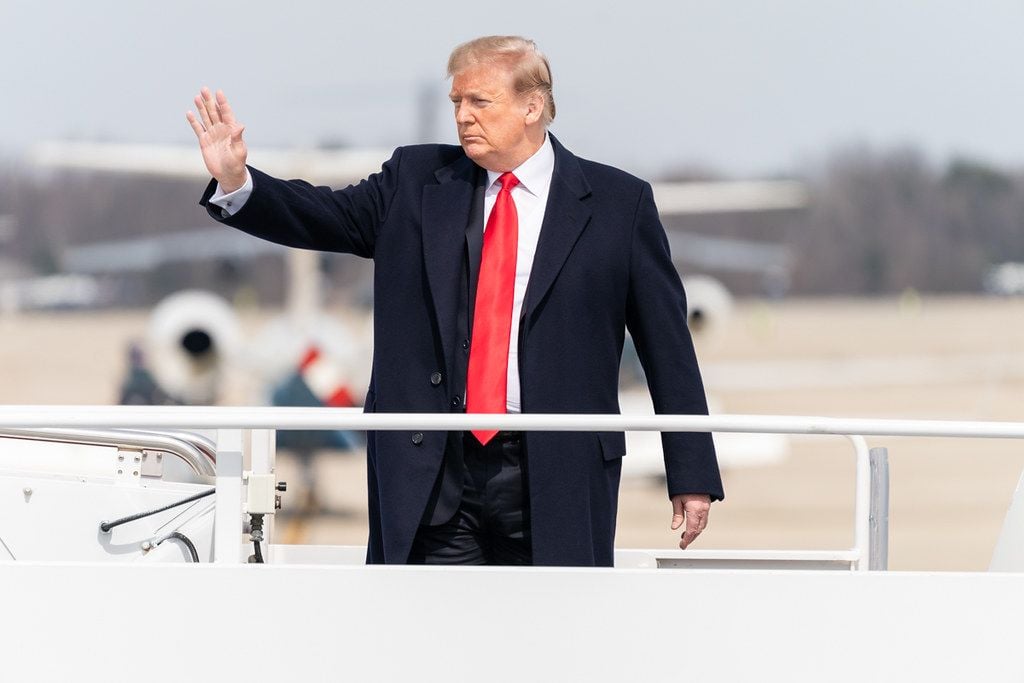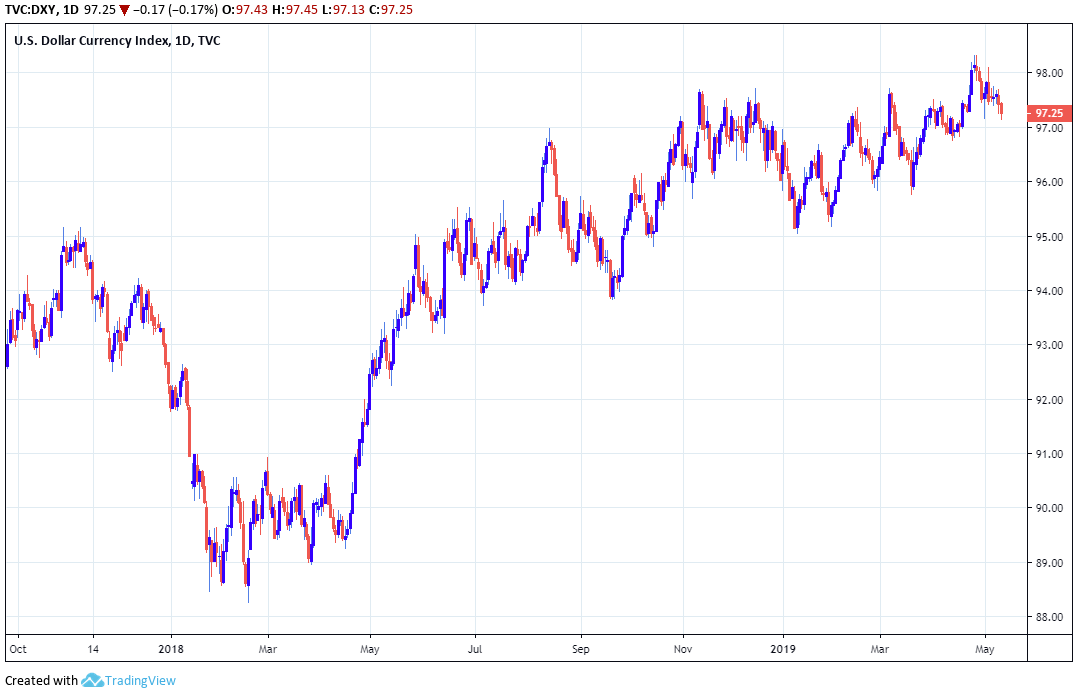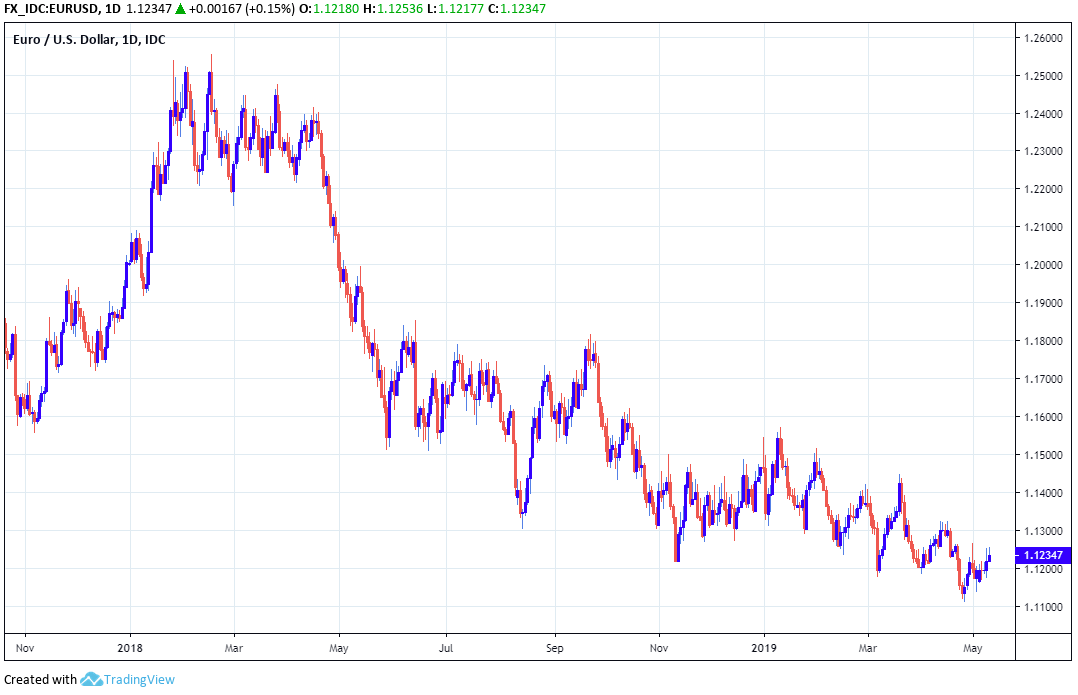The U.S. Dollar could Remain Supported while the White House is on the Warpath
- Written by: James Skinner

Image © White House
- USD weakness may be short-lived amid trade war escalation.
- As another global growth slowdown may be just around corner.
- 11th hour deal would hurt USD, continued tension offers support.
The Dollar was softer in the final session of the week but with President Donald Trump appearing to be on the war path, analyst calls for continued short-term weakness have been conspicuously absent heading into the weekend.
President Trump has raised the tariffs levied on $200 bn of China's annual exports to the U.S. after the world's second largest economy allegedly reneged on commitments it had previously made over its "unfair trading practices".
Furthermore, Trump claimed in a Twitter post Friday that he's set the ball rolling on a process that could ultimately see China's remaining $325 bn of annual goods exports to America subjected to tariffs if a deal ending its problematic trade practices is not agreed sooner or later.
These tariffs will make it more expensive for American companies and consumers to buy Chinese products, thereby reducing their attractiveness relative to alternatives from other countries. That could see China's exports crimped and economy damaged.
....The process has begun to place additional Tariffs at 25% on the remaining 325 Billion Dollars. The U.S. only sells China approximately 100 Billion Dollars of goods & products, a very big imbalance. With the over 100 Billion Dollars in Tariffs that we take in, we will buy.....
— Donald J. Trump (@realDonaldTrump) May 10, 2019
Tariffs were scheduled to reach 25% on March 01 but the White House suspended the increase "indefinitely" after China agreed to enter talks aimed at addressing U.S. concerns. But there was always a caveat to that suspension requiring good faith negotiations that culminate in a deal.
China has now pledged to respond, presumably with increased tariffs of its own, meaning the world's two largest economies are once again on the brink of an all-out trade war that could have significant implications.
"While a deal may still be in the making, don’t expect a smooth path towards this outcome. Markets will remain sensitive to news from both the ongoing negotiations, and any signs that these raised tariffs cause a ripple effect," says Elwin de Groot, head of macro strategy at Rabobank.
This renewed trade fight could potentially put a range of G10 currencies under pressure and prop up the Dollar for a bit longer because of the impact it might have on global growth.

Above: U.S. Dollar Index at daily intervals.
"While the focus on the trade war has caused the economic data from China this week to fly under the radar, they have not been encouraging either. Export growth was especially disappointing in April, and credit growth – one of the more reliable leading indicators of China’s economy – ticked down last month. There is also evidence that fiscal support is waning, after local governments front-loaded spending for this fiscal year," says Oliver Jones, an economist at Capital Economics.
Last year's tariff conflict put the Chinese economy under pressure, prompting its government to provide significant stimulus. However, none of that stimulus prevented other Asian economies from getting hurt as Chinese demand for their goods declined too.
Neither did the Chinese stimulus prevent the German and Eurozone industrial sectors from slipping into recession. It's that industrial recession in Europe that prompted the GDP growth downturn of 2018 that has since forced the European Central Bank (ECB) to abandon plans for a 2019 interest rate hike.
It was that slow down and collapse of hope for an ECB interest rate hike, which played as the U.S. economy basked in the glare of White House tax cuts and enabled the Federal Reserve to raise its interest rate four times, that drove the EUR/USD to swap a 4% first quarter gain for a -4% 2018 loss.
"Looking back at 2018 when China import tariffs were implemented, the FX response was muted back then too. Yes, the big move in EUR/USD came in late April and May and that was partially pricing in the risk of tariffs that Trump had signalled in March," says Lee Hardman, an analyst at MUFG. "The dollar did of course then strengthen in Q4 as growth in the euro-zone and China weakened, so the markets for now may well reserve judgement on the relative economic impact of this announcement."

Above: Euro-to-Dollar rate shown at daily intervals.
"The global economy is still slowing, slowly. If the US and China give up on trade talks and give global trade another whack, the slowdown will accelerate, probably triggering a broad-based increase in financial market volatility, as well as yuan weakness and with it, broad-based dollar (and yen) strength," says Kit Juckes, chief FX strategist at Societe Generale.
The danger for those betting against the Dollar is that these latest trade tariffs simply compound the earlier damage to the Chinese and global economies, sidelining the relevant central banks in the process.
That would leave investors with little reason to bid for G10 currencies other than the Dollar and if the U.S. economy happens to avoid the sharp slowdown analysts have forecast for it this year, then the Fed could leave its interest rate at the current 2.5% level.
Such an outcome would entrench the Dollar's yield advantage over other currencies for longer, although analysts say the U.S. economy will not sheltered by tax cuts this time around and that a slowdown would risk Federal Reserve rate cuts that could hobble the Dollar if not matched by other central banks.
"We have highlighted before three key channels that would impact the Euro area if the trade war between US and China escalated: uncertainty; trade spillovers and the FX impact," says Ahditya Bhave, an economist at Bank of America. "The impact on the US and Chinese economies would spread to the Euro area economy towards the end of 2019. A sudden move in the CNY would impact Euro area exports severely, particularly in Germany - also at the end of 2019 and 1H 2020. And uncertainty would still be there - intensifying even. All in all, we would expect the economy to decelerate throughout 2019 and barely avoid a recession in 1H 2020."
Time to move your money? Get 3-5% more currency than your bank would offer by using the services of foreign exchange specialists at RationalFX. A specialist broker can deliver you an exchange rate closer to the real market rate, thereby saving you substantial quantities of currency. Find out more here.
* Advertisement




